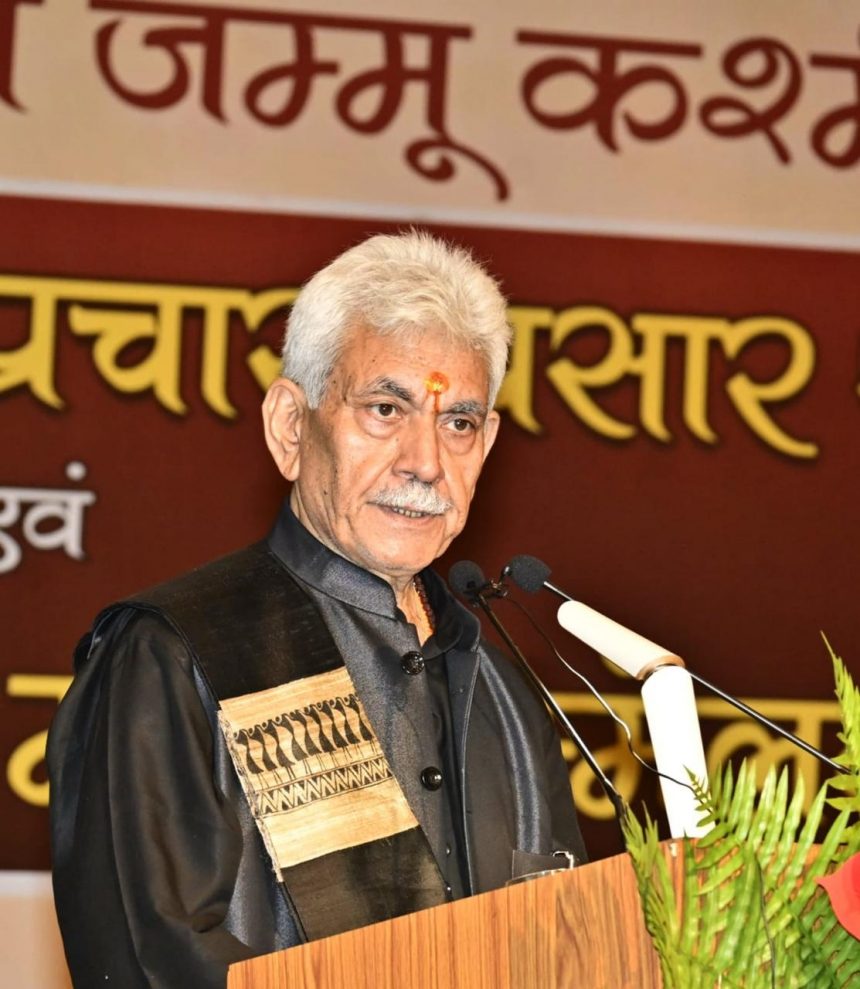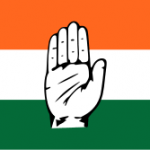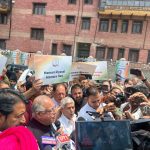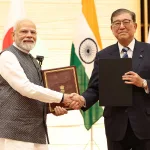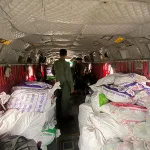JAMMU, JULY 19:Reiterating India’s firm stance that “blood and water cannot flow together,” Lieutenant Governor Manoj Sinha on Saturday said that the termination of the Indus Water Treaty (IWT) with Pakistan was a historic and transformative step.
The Lieutenant Governor described the move to end the decades-old treaty as a decisive and befitting response to Pakistan’s continued sponsorship of terrorism, including the recent attack in Pahalgam. “Terror and talks cannot go together. This is a new beginning where India’s waters will remain in India,” he asserted.
He made these remarks at the launch of the monograph ‘Indus Water Treaty – Mirroring the Facts’ authored by senior journalist Sant Kumar Sharma.
Referring to Prime Minister NarendraModi’s leadership in terminating the treaty, Sinha emphasised that this decision paves the way for Jammu and Kashmir to harness its true hydroelectric potential. “With full control over Jhelum and Chenab rivers, the barren areas of Jammu can be irrigated, and infrastructure development will gain momentum,” he said.
Sinha also pointed out the likely fallout for Pakistan, whose agriculture and drinking water depend overwhelmingly on the Indus water system. “16 million hectares of their land is watered by these rivers. The cancellation of the treaty will hit them where it hurts most their economy,” he said.
Citing figures, Sinha added that over 80% of Pakistan’s agriculture and 93% of its water consumption comes from the Indus system. “The wheat, rice, and cotton their people survive on are dependent on water that flows from our land. That is about to change,” he said.
Delving into the origin of the 1960 treaty, Sinha quoted parliamentary debates to show that there had always been opposition to the agreement within India. “Even after wars in 1965, 1971, and Kargil in 1999, we did not reconsider the treaty. But the time has come to learn from our past.”
He referred to MPs like Iqbal Singh and HarishchandMathur who had opposed the treaty even when they were members of the ruling Congress party. “They warned that India had made sacrifices just to please Pakistan. They were right. Even AtalBihari Vajpayee had said the treaty would harm India in the long run,” he recalled.
Sinha said that the treaty even prevented India from de-silting rivers within its own territory. “For 60 years, Jammu and Kashmir could not even clean the sediments of its rivers. That is how deep the injustice was.”
LG Sinha reflected on the changing mindset of Kashmir’s people. “Pakistan has destroyed generations in Kashmir through its narrative of hate. But the common Kashmiri is waking up. They now know that their future is not with Pakistan,” he said.
Acknowledging the sacrifices of India’s security forces, Sinha said that terrorism survives only when it finds local support. “That support is fading. Except for a few motivated individuals, the people have seen the truth. This change is irreversible,” he said.
It is important that our youth know why this treaty was signed, how it failed us, and how we are correcting it. They must learn the history of compromises made at the cost of national interest,” Sinha said, calling on the younger generation to understand the significance of this moment.
During the event, the LG paid homage to the civilians martyred in the Pahalgam terror attack and reiterated the administration’s commitment to the victims’ families. “No terror victim family will be left behind,” he said, assuring employment, financial aid, and justice to the affected.
The monograph’s launch was attended by prominent figures including Anuradha Sharma; Ashok Bhan, Member, Shri Mata Vaishno Devi Shrine Board; Prof. BK Kuthiala, former Vice-Chancellor; Zorawar Singh Jamwal, Chairman of Team Jammu; senior officials; and members of the literary and media community.


